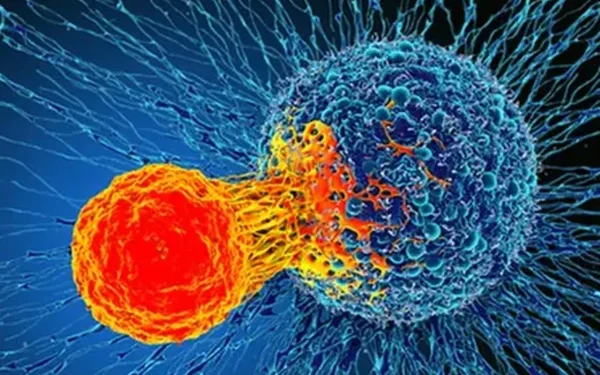Washington, D.C. – In a groundbreaking advancement in cancer diagnostics, researchers at Johns Hopkins University in the United States have developed a highly sensitive blood test capable of detecting cancerous tumors years before symptoms appear. This pioneering approach offers new hope in the battle against cancer by enabling earlier diagnosis, timely intervention, and significantly improved treatment outcomes.
The study, published in the prestigious journal Cancer Discovery, provides compelling evidence that genetic material shed by cancerous tumors—called circulating tumor DNA (ctDNA)—can be identified in blood samples up to three years before the onset of clinical symptoms.
Understanding the Science: Detecting Cancer at the Molecular Level
What Is Circulating Tumor DNA (ctDNA)?
As cancer develops, tumor cells grow and divide uncontrollably, eventually releasing fragments of their mutated DNA into the bloodstream. These DNA fragments, referred to as circulating tumor DNA, can be isolated and analyzed using advanced genome sequencing technology.
The latest diagnostic tool developed by Johns Hopkins researchers harnesses this concept to conduct genome-wide assessments of ctDNA, detecting the subtle but tell-tale genetic mutations that signal the early presence of malignancy—even before imaging scans or physical symptoms would raise clinical suspicion.
The Study: How Researchers Achieved the Breakthrough
Utilizing the UK’s NHS Health Study Data
The research team utilized archived blood samples from a long-term health study conducted by the United Kingdom’s National Health Service (NHS). Originally designed to investigate cardiovascular disease, this database provided an ideal opportunity to analyze real-world blood samples collected years before any diagnosis of cancer was made.
The scientists selected 52 individuals for the study, splitting them into two groups:
- 26 individuals who developed cancer within six months to three years after blood samples were taken.
- 26 cancer-free individuals, serving as the control group.
Using a new, ultra-sensitive genome sequencing method, the researchers performed a rigorous analysis of the samples. The result: in 8 of the 52 individuals, the test detected positive signals of multiple cancers (MCED test) at the time of blood collection—months or years before diagnosis.
Multi-Cancer Early Detection (MCED): A New Frontier in Diagnostics
What Is the MCED Test?
The Multi-Cancer Early Detection (MCED) test is designed to detect multiple types of cancer simultaneously through a single blood draw. The test identifies cancer-associated changes in ctDNA, including mutations, methylation patterns, and structural variations in genetic material.
MCED technology represents a major evolution from traditional single-cancer screening methods, such as mammograms for breast cancer or colonoscopies for colorectal cancer. It provides a non-invasive, wide-spectrum approach to cancer detection, potentially identifying tumors in organs where no routine screening exists.
Key Findings: Early Detection Could Save Lives
Lead Researcher Emphasizes Early Intervention Potential
Yuxuan Wang, co-author of the study and a postdoctoral researcher at Johns Hopkins University, emphasized the critical value of early detection. Wang stated:
“Being able to identify cancer as early as three years before any symptoms appear gives doctors a crucial window to begin treatment. At this stage, tumors are usually smaller, localized, and more likely to respond to therapy.”
This early intervention could significantly improve survival rates and quality of life for patients across a wide range of cancer types.
Implications for Global Healthcare and Cancer Treatment
From Reactive to Proactive Medicine
Historically, cancer diagnoses often occur after physical symptoms appear, which frequently indicates advanced-stage disease. Late-stage diagnoses are associated with poorer prognoses, limited treatment options, and higher healthcare costs.
By contrast, tests like MCED could shift the entire paradigm of cancer care from reactive to proactive. If integrated into routine health checks, this test could:
- Detect cancer before metastasis (spread to other organs).
- Reduce mortality through earlier, more effective treatment.
- Improve resource allocation in oncology departments by identifying high-risk patients sooner.
- Lead to cost savings for healthcare systems due to reduced reliance on late-stage cancer therapies.
Types of Cancers Potentially Detectable by the New Test
Though the test is still in experimental stages, researchers believe it has the potential to detect a wide variety of cancers, including:
- Lung cancer
- Colorectal cancer
- Pancreatic cancer
- Liver cancer
- Ovarian cancer
- Stomach cancer
- Esophageal cancer
- And possibly more rare cancers with no current screening tests
The ability to detect hard-to-diagnose cancers, such as pancreatic and ovarian cancers—which are often found only after they’ve advanced—could be life-changing for thousands of patients each year.
Next Steps: From Research to Clinical Practice
Challenges Ahead in Implementation
Despite the promising results, several hurdles remain before this technology can be implemented on a large scale. These include:
- Validation through larger clinical trials
- Regulatory approval from health authorities like the FDA or EMA
- Ensuring test accuracy and reducing false positives or negatives
- Cost-effectiveness and insurance coverage for population-wide testing
- Ethical considerations around early diagnoses and follow-up procedures
However, the growing global interest in liquid biopsies—non-invasive tests that use blood samples to diagnose conditions—is accelerating the pace of innovation and regulatory approval.
Global Race for Blood-Based Cancer Detection
Other Institutions in the Arena
Johns Hopkins is not alone in the pursuit of early cancer detection. Other prominent companies and research institutions are also exploring blood-based diagnostics, including:
- GRAIL, which has launched the Galleri test, currently in pilot programs across the U.S.
- Exact Sciences, developers of Cologuard, a stool-based test now expanding into blood-based diagnostics.
- University of Oxford and China’s BGI Genomics, both working on similar technologies.
This global competition could eventually lead to affordable, universal screening tools that become part of annual health checkups.
Public Health Impact and Patient Empowerment
The Future of Personalized Cancer Screening
The development of blood tests like this signals the dawn of a new era in personalized medicine. By integrating genetic information with medical history and lifestyle data, doctors could:
- Tailor screening schedules to individual risk profiles
- Monitor at-risk populations with minimal invasiveness
- Offer preventive interventions rather than waiting for disease onset
As public awareness grows and test accuracy improves, these tools could empower individuals to take more control over their health, leading to better patient outcomes across age groups and demographics.
Conclusion: A Leap Forward in the Fight Against Cancer
The Johns Hopkins study represents a monumental step forward in the early detection of cancer. With the ability to detect cancer before any symptoms manifest, the new blood test has the potential to transform global cancer care, saving millions of lives in the process.
While more research and regulatory pathways remain to be navigated, the vision of a simple, non-invasive, multi-cancer screening test available to everyone is closer than ever.

























